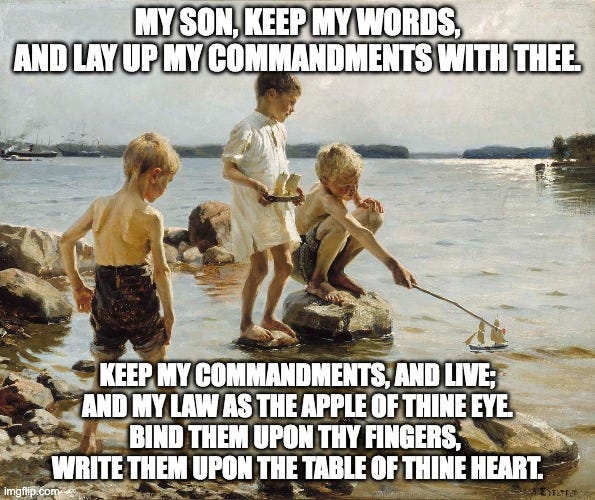First Time Listening
So now that I am old and grey… father of six, father-in-law of six, and grandfather to twenty-five… it’s time for me to pass some wisdom down. I am thinking of starting a series of posts, which I will also send as emails to my children. Posts particularly about child raising.
First time listening
Sometimes the harder thing to do is the easier thing to do. Or, rather, sometimes doing the harder thing will give you an easier life... long term. And, I would argue, the harder thing will often lead to a more moral life, a more Godly life. One of these areas is the area of 'listening'.
Now, this is a hard topic, a difficult subject, in part because there doesn't seem to be a name that fits. The name I am tempted to give it is 'Daddy!'.
Let me lay it out as a situation. A man, a father, is standing somewhere. Perhaps they are cooking, perhaps they are talking, perhaps... writing a blog post or substack! Anyway, there they are, doing something, and some child comes up to them and says, “Daddy.”. Or maybe “Daddy?”. Or even “Daddy!”. And then the father... keeps doing what he is doing.
Now, let me interject something really quickly here. I am NOT going to be talking about how the father is selfish, or how he is ignoring his children, or anything like that. What I AM going to be doing is presenting the parenting dilemna referenced here, and giving a solution.
The Dilemma
The problem for the father here is something that all of us have faced. Indeed, the problems here are something that all of us have faced. It is the combination of multi-tasking, and children. And a dozen other things but lets start with those two.
The father is doing something. We're not going to talk about how important or not the thing is, that is not what we are looking at. We are going to take it as a given that the father is doing something, and the child is interuppting. Or, at the very least (or very best) the father is faced with the choice of doing one of two things... keep going with what he is doing, or interuppting what he is doing to deal with the child.
AND I am NOT going to tell you 'Well, it is more important to deal with your child...”. No, no, no. Maybe what he is doing is dealing with a different child? Or his wife? Or he's on the phone with his boss??
NO, we are starting this with the problem, the dilema, that both things are important. And the father wants to do both, and he can't do both. That's where we are starting.
The Solution
Ok, not the whole solution, but I wish to give a first part of the solution. And it is a HARD answer in the beginning. It gets easier as time goes on, and easier and easier after that. The solution is... answer the child ON THEIR FIRST ATTEMPT. The very first time the child tries to get your attention, you give it.
But that is not the end. Not close. Because the answer you give is very important. It could range between:
Initiating discipline. If you have rules, and the child interrupting you at this time is against the rules, then you need to initiate discipline. In the short term, this is annoying and an interruption, indeed possibly a serious interruption. But in the LONG term... you will diminish this kind of interruption.
Telling them to wait. In the short term, this might be a long interruption, as they will try to get their question in. So you will then have to move into discipline. But in the LONG term, this interruption will take one second. “Wait.”
Dealing with their issue. If they have asked at an appropriate time (discussion below) and what you are otherwise doing is not of a super high priority... then give them your attention, and answer their question!
Rules
Now, in order for the above to work, I believe you have to have some (stated or unstated) rules that lets everyone know if, when, and how the child should ‘interrupt’.
They don't keep asking
The important part of responding to them the first time they ask is that... they don't keep asking. (Eventually. At first you have to train this, which will take time.) When you don't have this done, don't have this trained, what will happen instead is that they will keep asking, keep interrupting, louder and louder. And you will train them to do this the next time.
So the first rule is, “You don’t keep asking. You ask once, and wait.”
Seen not heard
The second rule is that children should be seen and not heard. By this I mean that children’s activities should, ideally, take place outside of an adults hearing. This means that when a child does speak, they can be more easily heard. It is not one more child noise among thousands, but a novel event.
Standing and waiting
The obvious corollary to ‘Seen not heard’ is ‘stand and wait’. If a child enters a situation and stands, facing the parent, and waits quietly, this gives everyone in the situation much more power. The father can finish the paragraph he is writing, or the line of code. Or, if it is a good time, they can call upon the child right away. Ideally the parent will make some motion to indicate they realise the child is waiting.
Interrupting vs good time
The next rule is actually a rather complex thing, which each family might need to work out on their own. It is to define what an ‘interruption’ is. If the house is on fire, this information is never an ‘interruption’. As Roberts Rules says, it is always ‘in order’. On the other end of the scale, a comment about a cricket you have seen is much more likely to be ‘out of order’. If Daddy is working, especially if Daddy needs to concentrate for his work, then such comments should wait.
But, as I say, each family must make these rules on their own, since we are all different as to how much noise we can stand helpfully.
Appropriate time
The obvious corollary to the ‘interrupting’ rule is for the parent to build ‘good times’ deliberately into their schedule. Suppose the father who is busy writing makes it a habit to get up every hour and wander into the house proper. Suppose he even says, “Well, Daddy is here, what do you all have to say for yourselves?”
What's going on
If you look at the situation from a process standpoint, or a feedback standpoint, the solution is simple. Your daughter comes to you with a desire: get Daddy's attention. The child has a method: Saying 'Daddy'. The child tries the method... and Daddy doesn't respond. She doesn't get Daddy's attention. So she changes her method. She says, “Daddy,” a little bit louder, or with a bit more emotion. And she tries again and again. Until, finally, she gets her desired result.
And she files the information in her brain:
Q: How do I get Daddy's attention?
A: By saying 'Daddy' repeatedly, louder and with more emotion, until he answers.
And, unfortunately, the same thing happens to Daddy (or Uncle, or Grandpa, or Teacher, etc.). She learns 'When I am around my children, I have to undergo a series of noises while I try to accomplish a task...” or some-such.
Win, Win
The solution I provide is a win win for both parties. The child gets answered quicker, the parent gets interrupted more rarely. And, to bring home the point to our relationship with God… they learn what God the father is like.
Now, now, I know… God the father is never ‘busy’. He can hear all the prayers of all the people at the same time without a millisecond’s delay. But that doesn’t mean that the child (and you) aren’t learning anything here. Because we all know that we are called to ask God… and ask rightly.
With the parent the child needs to ask at a good time, with God they need to ask with faith. The child needs to judge the importance of their interruption, the child of God needs to judge its accordance with the Will of God. (Indeed, one of the ‘extra for experts’ here is teaching the child the same thing. No, don’t ask me for ice cream ten minutes before dinner.).
But, most importantly, asking the parent rightly is honouring to the parent, and asking God rightly is honouring to God.
Conclusion
This is the first of several posts, hopefully a whole series of posts, on various issues in parenting. I have about a dozen rummaging around my head. I hope and pray that it will be useful.
Thank you for reading Von’s Substack. I would love it if you commented! I love hearing from readers, especially critical comments. I would love to start more letter exchanges, so if there’s a subject you’re interested in, get writing and tag me!
Being ‘restacked’ and mentioned in ‘notes’ is very important for lesser-known stacks so… feel free! I’m semi-retired and write as a ministry (and for fun) so you don’t need to feel guilty you aren’t paying for anything, but if you enjoy my writing (even if you dramatically disagree with it), then restack, please! Or mention me in one of your own posts.
If I don’t write you back it is almost certain that I didn’t see it, so please feel free to comment and link to your post. Or if you just think I would be interested in your post!
If you get lost, check out my ‘Table of Contents’ which I try to keep up to date.
Thanks again, God Bless, Soli Deo gloria,
Von







As a fellow-grandparent, I would like to suggest to you an organization that is good for grandparents who sense a burden for their offspring. It is called Legacy Coalition and is found at https://legacycoalition.com/
I have been involved ever since I went to one of their annual summits focusing on Intentional Christian Grandparenting. Another one is coming up in February next year.
Solid thoughts about family order. It's something my family deals with often, and you're right that training is necessary.
You also win the understatement of the day award: "sometimes doing the harder thing will give you an easier life... long term. "